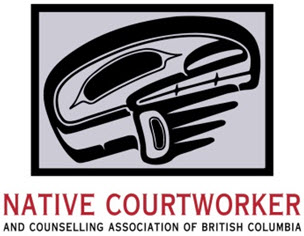Native Courtworkers have been a helping hand to justice for the past 45 years - connecting BC clients and communities to the justice system. They strengthen the system’s ability to be fair and effective for Indigenous people and make the system more efficient.
Find out what the 30 Native Courtworkers providing services at 59 court locations in BC do - and what they don’t do.
Operated by the Native Courtworker and Counselling Association of British Columbia, the Native Courtworker program serves clients who are persons of First Nations, Metis and Inuit descent free of charge. The program is funded by the BC Ministry of Public Safety and Solicitor General and the Federal Department of Justice.

Native Courtworkers also:
• Provide culturally sensitive support to clients in-court and out of court
• Promote effective use of court time by helping clients attend court and meet court ordered obligations
• Liaise with court staff, Crown counsel (prosecutors), defence lawyers and Legal Aid on behalf of clients
• Provide important information to clients about sentencing and judges’ orders or directions
• Act as a “friend of the court”, as instructed by clients or defence counsel, to provide information at sentencing or bail hearings and applications to cancel arrest warrants
• Strengthen linkages between people, communities, organizations and the justice system.

Native Courtworkers can:
• Help clients get and understand court forms, documents and written information
• Give clients information about legal proceedings, court processes, dispositions and directions given by the court, roles and responsibilities, alternative/restorative justice options, and sentencing matters
• Speak to potential Indigenous clients in custody
• Give the court information on available community resources and sentencing options
• Contact potential sureties
• Coordinate and prepare applications for bail
• Help registry staff facilitate translation or interpreter services
• Prepare cases, including documentation, court briefs and reports
• Assist in the dialogue between client, court officials, the presiding judge, Crown Counsel (prosecutor) and others
• Help clients add matters to the court list with the assistance of registry staff
• Liaise between community corrections, other justice partners and clients to achieve common goals of justice.
However they cannot:
• Provide legal advice
• Appear in court unless they have received instructions from a client or lawyer
• Assist a client in speaking to a sentence, unless clients do not qualify for Legal Aid, cannot afford a lawyer and all other legal supports have been exhausted.
In 2005, the Native Courtworker program was designated under s.802.1 of the Criminal Code. As a result of this designation, Native Courtworkers can act as an agent and appear for a defendant in court to examine and cross examine witnesses if the defendant may be liable, on summary conviction, to imprisonment for a term of more than 6 months and the client does not qualify for Legal Aid, cannot afford a lawyer and all other legal supports have been exhausted.
Lynda Cavanaugh, Assistant Deputy Minister, Court Services Branch recognizes the important contributions of BC’s Native Courtworkers, saying “Better informed court users are better for our courts. Working collaboratively with Native Courtworkers brings us closer to realizing our goals of building a culturally sensitive, fair and efficient justice system.”
Chief Judge Thomas Crabtree adds, “Our justice system benefits every day from the work of our dedicated Native Courtworkers. They help Indigenous people understand and navigate the court system and help judges understand and respond to the needs of Indigenous people and communities, to the benefit of everyone in the province.”
For more on information, see A Helping Hand to Justice - Native Courtworker and Counselling Association of BC.

